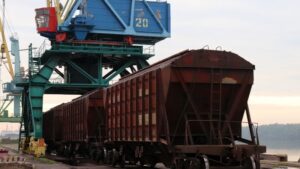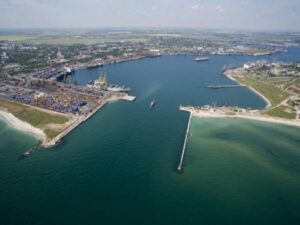
The unloading of railcars with grain in the ports of Greater Odessa has stopped due to the stoppage of the “grain corridor”: only 10 railcars were unloaded over the past 24 hours, Ukrzaliznytsia (UZ) reported in its weekly report on Monday.
The average daily indicator of carload shipment in the ports of Greater Odessa due to the blocking of the “grain corridor” in July amounted to 80 cars/day, having deteriorated over the last week by 30 w/c.
At the same time, a slight increase in the number of railcars with grain, which move in the direction of the ports of Greater Odessa – up to 168 cars from 109 cars, the report said.
The load on the port of “Izmail”, which is an alternative for the export of grain cargoes continues to increase. Over the past week (from July 24 to July 31), the total queue of cars that move in the direction of the port amounted to 7.8 thousand cars, of this number – 3.034 thousand cars with grain. This is by 500 cars, or 19.7%, more than last week, when there were 2,534 cars in the queue.
The average daily unloading rate of grain cars at the port “Izmail” is 88 cars per day, which is 15 cars per day or 14.5% less than in the previous week.
“Due to weather conditions (wind, precipitation) and restrictions on the passage of trains, the daily unloading of grain cargo in the port “Izmail” decreased. The situation with unloading is gradually normalizing”, – it was reported.
In addition, in the direction of the transition Serpneve-1-Basarabeasca (Moldova) is fixed accumulation of about 1.3 thousand cars, including grain – 319 cars, with oil – 153 cars.
Earlier it was reported that the number of ships in the port of Izmail, according to the data of Marine Traffic monitoring application, increased to 120 on Monday against 109 last week, 32 more ships are expected to arrive. During the week, the number of ships at the port ranged from 111-113. The number of vessels at the Port of Reni decreased to 58 vessels on Monday compared to 64 last week. Another 16 vessels are expected to arrive. On Saturday there were 54 ships in the port, during the week – 58-61. Traffic has not resumed in the largest Black Sea ports.

Nibulon” JV LLC (Mykolaiv), one of the largest operators at the grain market of Ukraine, in January-June 2023 transported by its own fleet from the branch “Bessarabskaya” (Izmail) to Constanta, Romania about 80 thousand tons, or 15% of the total shipments of the company during this period.
According to the grain trader’s website, this was made possible by the redeployment of the fleet from Nikolaev, which involved disassembly of the vessels, their transportation by land to the Danube and their subsequent reassembly at the Bessarabian branch. In total two port tugs “Nibulon-12” and “Nibulon-14”, tugs “Nibulon-3” and “Nibulon-11” and two handling machines Terex Fuch mhl 385 were transported this way.
The announcement indicates that the Nibulon also began providing tug, mooring and unmooring services for vessels on the Danube. In January-June 2023, the number of hours worked in this way increased 18-fold.
“In the spring, Nibulon was able to resume shipping on the Middle Dnieper. Now tugs “Nibulon-10”, “Hermes-2” and non-self-propelled barges UAK-1, UAK-2, UAK-3, UAK-4 work here, and the branch “Kremenchugskaya” acts as a central transshipment hub that receives grain from water transport and reloads it into the cars”, – stressed the press service of grain trader and added that during April and May 2023 more than 15 thousand tons of grain were transported this way.
It is noted that the shipping company of the grain trader plans to increase the volume of services to third parties in Ismail, as well as to increase the volume of traffic to Constanta by optimizing the routes.
“The experience of sea routes in winter and spring allows the company to choose exactly sea routes instead of the Danube, which affects the speed of the fleet,” summarized the “Nibulon”.
JV Nibulon LLC was founded in 1991. Before the Russian military invasion, grain trader had 27 transshipment terminals and complexes to receive the crops, the capacity for one-time storage of 2.25 million tons of agro products, a fleet of 83 ships (including 23 tugs) and owned the Nikolayev shipyard.
“Nibulon” before the war worked 82 thousand hectares of land in 12 regions of Ukraine and exported agricultural products to more than 70 countries.
The grain trader exported a maximum of 5.64 million tons of agricultural products in 2021, reaching a record volume of deliveries to foreign markets in August – 0.7 million tons, the fourth quarter – 1.88 million tons and in the second half of the year – 3.71 million tons.

The Ministry of Development of Communities, Territories and Infrastructure (Minvosstaniya) is preparing to concession the first and fifth terminals of the Chornomorsk sea port.
“The first stage is the development of a feasibility study (feasibility study), the next stage is to hold a tender among those wishing to receive the port terminals “Chernomorsk” for concession,” the press service of the Ministry of Reclamation said in a statement on Friday.
The Ministry reminded that the process of transferring the terminals to concession had begun even before the full-scale invasion of Russia.
Deputy Prime Minister and Head of the Ministry of Restoration Alexander Kubrakov explained that the private partnership will lead to significant investments in the terminals, will optimize the logistics of transportation and improve the quality of service.
Besides, according to his words, thanks to the concession Ukraine will annually receive concession fee and taxes collection to the budget.
The feasibility study will be financed by the Global Infrastructure Fund, experts and consultants will be provided by the European Bank for Reconstruction and Development and the International Finance Corporation.
As reported, in 2021, the Ministry of Infrastructure and the State Enterprise “Administration of the Sea Ports of Ukraine” transferred the state stevedoring companies of the sea ports “Kherson” and “Olvia” to private partners of the state.
Concession is an agreement on the transfer of natural resources, enterprises, other economic facilities owned by the state or a territorial community for temporary operation by other states, foreign firms, private persons.

On May 9 the sea port Izmail fulfilled the annual plan of cargo handling in the amount of 6.187 million tons, which is a record in the history of the port, said the head of the State Administration of Sea Ports of Ukraine (SAPU) Yuri Litvin.
“The first position in the nomenclature of cargo of the seaport of Ismail in terms of the volume of transshipment – bread cargo, in the second – other agricultural products (oil, meal, sunflower seeds), in the third – pellets,” – said the agency on Facebook.
According to it the biggest volume of cargo handling was demonstrated by Izmail Sea Commercial Port SE (2.656 million tons), Dunaysudoremont PJSC (1.289 million tons) and Dunaysudoservis IRP PJSC (805.0 thousand tons).
The capacity of the port for the export of agricultural products has increased due to the introduction of berths for cargo operations with grains and vegetable oils by new terminal operators – JSC “Dunaysudoservis”, PJSC “Danaysudoremont”, PJSC “IPCK”, as well as due to the construction of a new terminal by “Nibulon” JV LLC, added AMPU.
“Increase of throughput capacity of Izmail sea port, which today handles a significant share of Ukrainian export, was facilitated by restoration of navigation in the mouth of Bystroe, increase of the water area of MF “Izmail” and dredging works in the port water area,” – Litvin said.
He emphasized that the Danube cluster is a key alternative route of export-import logistics, which is a priority for the further development of AMPU.
As reported, last year the transshipment in the port of Ismail increased to 8.89 million tons from 4 million tons a year earlier.
The volume of transshipment of cargo in the Danube ports by the end of this year may increase up to 20 million tons against 16 million tons last year, which is three times more than before the war, predicted Deputy Prime Minister – head of the Ministry of Reclamation Alexander Kubrakov in late April. Of these, 16-17 million tons are agricultural products.

Nibulon LLC (Mykolaiv), one of the largest operators at the grain market of Ukraine, intends to build an elevator and a high-tech mill at its Bessarabian branch (port Izmail) to increase the shipment of grain from the record 170,000 tons per month to potentially 300,000 tons, the company said on Facebook.
“To realize this potential, Nibulon is considering building a full-fledged elevator at the location, designed for simultaneous storage of 118.5 thousand tons of grain, as well as a high-tech modern mill with a capacity of 750 tons per day,” said Michael Rizak, director of government relations and sustainable development issues of the company during the visit of the US Ambassador Bridgette Brink to the branch.
Nibulon notes that the new mill will be able to work both for the needs of domestic consumers in Ukraine and serve the food security mission of the UN World Food Program (WFP).
“Now WFP uses the processing facilities of Turkey, sending there Ukrainian grain on the “grain corridor”. But it is also possible to transport ready-made flour, bran and other products of grain processing from Ukraine,” Rizak explained.
JV Nibulon LLC was founded in 1991. Before the Russian military invasion, grain trader had 27 transshipment terminals and complexes for reception of crops, capacities for one-time storage of 2.25 million tons of agricultural products, fleet of 83 vessels (including 23 tugboats), as well as owned Nikolaev shipyard.
“Nibulon” before the war worked 82 thousand hectares of land in 12 regions of Ukraine and exported agricultural products to more than 70 countries.
The grain trader exported a maximum of 5.64 million tons of agricultural products in 2021, reaching record volumes of deliveries to foreign markets in August – 0.7 million tons, the fourth quarter – 1.88 million tons and in the second half of the year – 3.71 million tons.
According to Opendatabot, Nibulon’s revenues fell almost 2.7 times to 15.18 million hryvnias in 2022, and its net loss was 10.53 billion hryvnias versus a net profit of 1.34 billion hryvnias a year earlier.

A blockade of Ukraine’s ports would boost foreign currency revenues from product exports by at least $20 billion, according to Alexander Vodoviz, head of the project office of Metinvest’s general director.
“We’re picking up crumbs from the table, but we’re not seeing the big pie,” Vodoviz said at Forbes’ Exporters Summit.
Vodoviz urged asking questions about port de-blockades at meetings with the U.N. “There is some movement in that direction, but it’s not enough,” he added.
“Metinvest is a vertically integrated group of mining and metallurgical companies. Its enterprises are located in Ukraine – in Donetsk, Lugansk, Zaporozhye and Dnipropetrovsk regions, as well as in Europe.
The major shareholders of the holding are SCM Group (71.24%) and Smart Holding (23.76%) that manage it jointly.
Metinvest Holding LLC is the management company of Metinvest group.